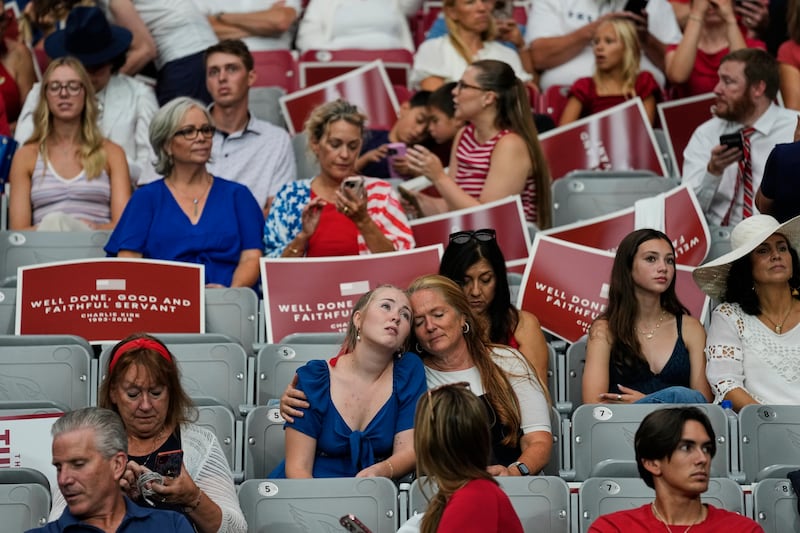Shortly after Charlie Kirk’s murder, a cousin of mine called and asked if I knew who he was. She had never heard of him. Neither had her father. Who was this man? What is Turning Point USA? Why was he shot? Could I help her make sense of the whole thing?
I don’t think you needed to be living in a bubble to have not heard of Charlie Kirk. There are plenty of apolitical people who never listen to podcasts and would have no reason to know who he was.
But then came the memorial service in Arizona, a gathering of 70,000 people with a distinctly evangelical Christian tone. And I found the reactions to that more concerning. My American Enterprise Institute colleague Thomas Chatterton Williams, for instance, tweeted that “I’ve spent half of my adult life living in one foreign country or another and I don’t think I’ve ever felt so estranged from the surrounding culture as I am from the aesthetics and sensibilities of this movement.”
To his credit, he noted, this is “Not even a criticism, I just feel more at home in Greece than in these images.”
Williams was not alone. Others who hail from a similar milieu (albeit not all from the U.S.) expressed similar sentiments.
Dan Williams, a philosophy professor in Australia, wrote on X that “Watching the Charlie Kirk memorial, I’m struck by how extremely culturally distant I feel from this world. Everything about it feels alien — the aesthetics, symbolism, music, rituals, mythology, gurus, ideas, and norms. It feels like being exposed to the cultural and symbolic universe of a distant tribe.”
Again, for Williams, this was not a moment of animosity per se. “In a strange way, despite opposing almost everything about this political project, this reflection makes me feel more empathy for what that project must feel like from the inside,” he wrote.
I grew up in and largely inhabit the same world that my cousin and these commentators do. I am Jewish; I’ve always lived in metropolitan areas in the Northeast; I went to an elite college, as did the members of my immediate family. Were I not bitten by a journalism bug after college, I think I would have regarded the memorial service and a large swath of the country with the same sense of cultural alienation.
When I started working as an intern for The Wall Street Journal in 1998, the newspaper had just added a column called “Houses of Worship.” I had no particular interest or expertise in religion, but I did want to find a way to get published. One of my first articles was about two young women who had been kicked out of the National Honor Society in high school for giving birth out of wedlock. I interviewed them about their religious beliefs, and how both believed they had committed a sin but neither wanted to compound that by having an abortion.
I remember being struck by their convictions and their willingness to speak to a complete stranger about something as intimate as their faith. I grew up around Reform and Conservative Jews, a few strong but reserved Catholics and some lapsed Protestants. But I was hooked. Not in the sense that I was about to convert. But I thought if you could choose to spend your day asking people questions, wouldn’t it be great if those questions were about the most important things in their lives?
I spent two years visiting two dozen religious colleges for my first book, talking to people who were evangelical and Buddhist and Catholic and Jewish and Latter-day Saints. And then I went to visit several more religious communities for a book on interfaith marriage and several more after that for a book on young adults and religion. I have visited LDS storehouses and watched debates over the existence of God in the deep South. I have visited Black churches leading foster-care efforts and observed weekend retreats for young Catholic school teachers.
Yes, being in a prayer service with thousands of people of another faith for the first time can feel alienating. Why are people raising their hands? Why do these performers sound like the Indigo Girls? Why is someone trying to hold my hand? Should I kneel when they kneel? Should I stand when they stand? Should I say amen? What should I do when someone offers me a blessing?
After being at dozens of such services, I can say it is never not uncomfortable for an outsider. But I am no longer nervous. And I am heartened that the people around me are generally friendly and compassionate. They love their families and their communities and their country, just like my friends and family back home. No one has ever really given me the hard sell, let alone threatened me with hellfire and brimstone if I didn’t believe, although I have certainly had people ask if they can pray for me, or give me a Bible.
I know it’s not feasible for everyone to spend years on the road experiencing other religious communities. But there is something to be said for what educated people used to call the “Grand Tour” —only I think it should be done in America instead of (or in addition to) the capitals of Europe. It wouldn’t take much to visit some churches. And since some say we are at the beginning of a religious revival in America, it seems more relevant than ever. The cross-cultural understanding could go a long way toward healing what is broken in this country.


